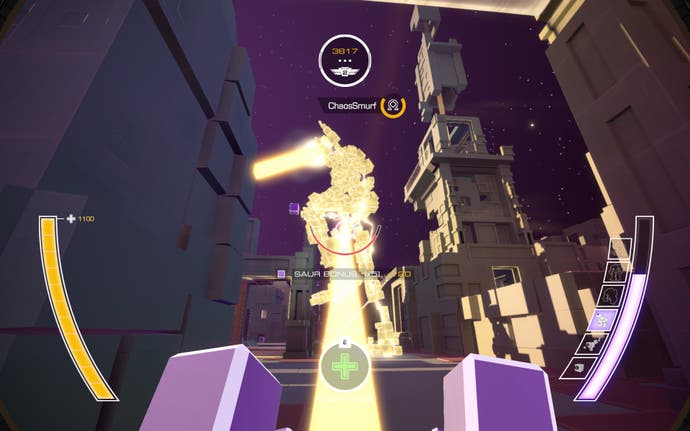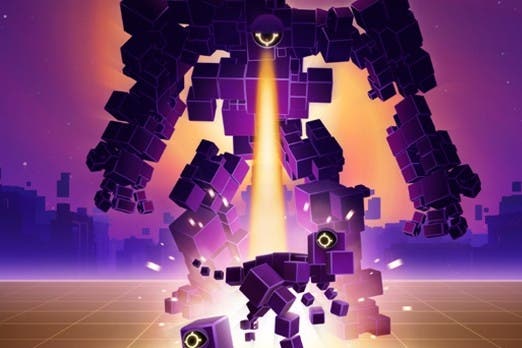Atomega review
Scale-bound.
When you are very small the world is a fast and dangerous place. Open spaces are frightening, so you rush through channels underground and find your perch in hidey-holes and gaps snugged between temple walls. When you are very big, the world moves more slowly: you are stately yet terrifying in your bulk - and you are also exposed. Everyone who wants a piece of you only has to look up to see exactly where you are, and that landscape of hidden channels and hidey-holes, that world of gaps and knots and secret causeways, has essentially disappeared. Open spaces are still frightening, and even as you slap your enemies away or seer them with ancient light while they race through your feet, you realise that the entire landscape is an open space now, and you the only real monument left.
Atomega is fascinating, a multiplayer shooter that feels nothing like a multiplayer shooter most of the time because it is driven by powers of ten. In Atomega you start each game with up to seven other players and one aim: to grow and grow and grow, sucking down the purple cubes that are scattered over the golden blocks and temples of this ancient arena you find yourself within. Purple cubes will take you from the glowing atom you start life as, through the tiers of life itself: from single-celled organism, to protozoa, to staggering dinosaur, loping gorilla, towering Superior and then the spindly skyscraping majesty of the Omega. Cubes are mass, and the more mass you have the more points you earn - and getting the most points is your defining ambition in this single-arena, single-mode blaster.
There is a boldness here: single-arena, single-mode. And a boldness in that idea, too, that you race through the game going from something tiny to something gigantic. And there is a splinter of glorious ruefulness too, because Atomega is a game in which you have to be careful about what you wish for. Collecting mass may be the objective, but how best to do that when seven other players are after the same thing? When everyone's moving endlessly across the same environment, waiting for those purple cubes to respawn in polite rows or tumble out of fountains, or deciding, instead, that enough time has passed, enough growth has taken place and that they now fancy their chances shooting you to pieces and picking the mass from your crumbling corpse.

It's not just a game of classic schoolyard match-ups, then: who would win if a raptor took on King Kong? It's a game that brings new balance to those match-ups. The gorilla is bigger than the raptor and its lasers do more damage, but the raptor is faster, and can utilise parts of the scenery that the gorilla is too large to access anymore. If you get enough mass, you eventually get to be the Omega - only one of these allowed at any time. It's brilliant wish-fulfilment as you stomp around, but it's also a constant nagging drain, because foes can now shoot mass off you, while you need to keep lasering them away, while also lasering up any extra mass you can find scattered about the place, because even now you need to keep bulking up if you want to ascend for a gigantic points bonus.
Ascending is not the end: the end only comes after ten minutes have ticked past. And you can win without becoming the Omega at all if you can stay large enough for long enough. That involves moving around the environment skilfully, hitting one spawn point of mass after another, but also knowing when to stop growing for a bit to focus your attention on whittling everyone else down to size before you seem like too much of a threat yourself. If you lose all your health, you instantly lose all your mass. Better - sometimes only just better - to hit the teleport key at the last second in a fight: you still lose some mass, enough to knock you down one rung on the evolutionary ladder, but you keep the rest, and you warp somewhere safe so you can bulk up a bit before heading back out.
Power-ups add playful twists: you can carry one at a time and either use them or discard them with the press of a button. They cover stuff like extra speed or extra damage, a shield or a knock-back effect to your lasers. One magnetises nearby mass to you, another heals you, another means that each unit of mass you collect counts double. None of these power-ups last very long, but all of them, deployed at the right moment, can change your fortunes.

They're fun, but the reason Atomega works so well is because that single map with its towers and chambers and causeways is actually a handful of individual maps squeezed into the same space, because the world looks very different when you're a speedy atom racing through cracks and when you're a bipedal god who uses the buildings you once cowered inside as a makeshift staircase. So many tricks to learn: gold-walled tunnels blast you along at incredible speeds if you can fit in them, revealing racing lines and shortcuts that only exist for creatures of a certain size. Back and forth it goes, the big guys smiting the little guys, the little guys learning to spot when the big guys are too exposed, and somehow smiting them back. Everything presents an opportunity: glowing walkways can be lasered into oblivion if you time your shots right, bringing mass tumbling down within reach, or dropping enemies into the void.
The void! The void is strangely potent here, suggested in the warping, jiggling soundtrack of squeaks and thrums and whistles, in the pitched battles of giant beasts, each of whom projects a wonderfully characterful shadow as you inhabit them, dino arms jiggling, ape hands fairly dragging over the ground. The plot announces that this is the end of time, that all surviving life in the universe has gathered around the last fading star for this endlessly repeated ten-minute game, with the final moment provided by the death of the sun in the sky above you. It's playful, it's funny, it's sad, and it's wonderfully evocative, all warm, carved stone and glowing purple cosmos.
Atomega has come to us from the incubator that made Grow Home, a game that took delight in exploring the huge things a tiny robot could achieve against all odds. The team's working away at the same theme again here, but it's adding a timely investigation of the other end of the scale too. This is a game that speaks to the fragility of power.


